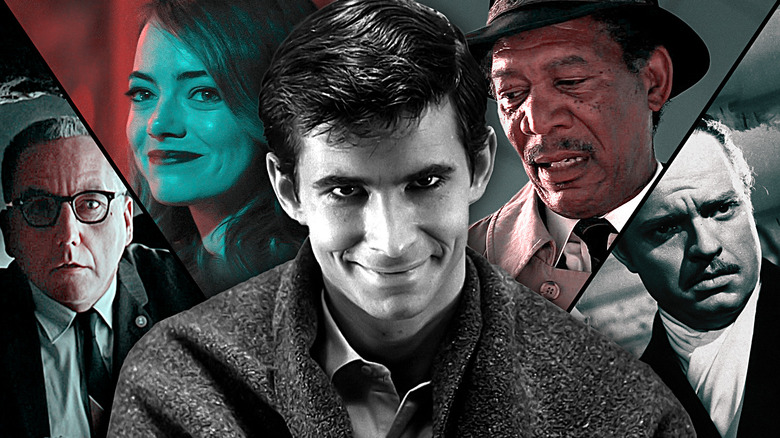
Static Media
As Rick and Ilsa taught us all too well on that fateful runway, there are few things more powerful than a heartfelt farewell. To provoke applause from the audience — or, better yet, that stunned and contemplative silence as they watch the credits still submerged in the final moments of a story well told — it is critical that a film nail its ending.
Whether through the unveiling of some mind-blowing twist, a sudden insight that changes the way you see the story, or a simple but powerfully human moment earned between two characters, the last sequence of a movie has the capacity to shape your understanding of all that came before — in and out of the theater. As such, we've taken great care in compiling some of our favorite movie endings of all time, ranking them based on quality, impact, and cultural staying power.
15. Michael Clayton
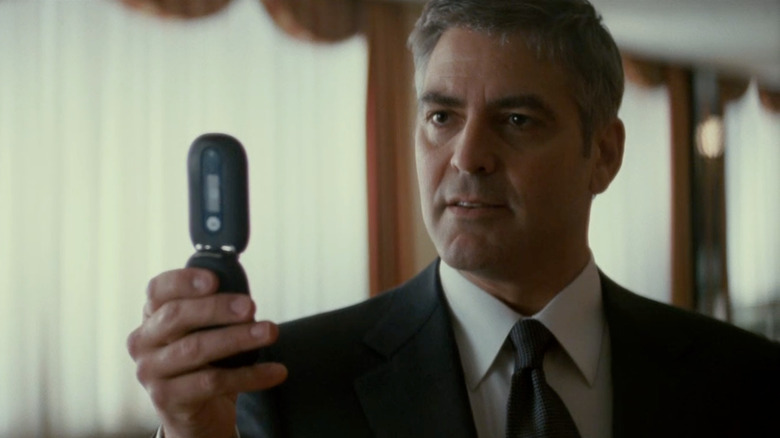
Warner Bros. Pictures
Tony Gilroy's "Michael Clayton" got something of a well-deserved reintroduction in 2022, after the writer-director made much bigger waves in the "Star Wars" universe with the acclaimed "Rogue One" sequel series "Andor." The 2007 film is full of all the tense, corporatist intrigue that would later inform his take on the galaxy far far away, following the eponymous fixer (George Clooney) as he becomes wrapped up in a multi-million dollar conspiracy spear-headed by Karen Crowder, a murderous lawyer (Tilda Swinton, in an Academy Award-worthy performance) for a massive pesticide conglomerate.
After Michael narrowly avoids death-by-explosion at the hands of Karen's associates, he ambushes her at the company offices, ostensibly to demand a $10 million payment in exchange for his silence. In agreeing to do so, Karen falls right into Michael's trap; he has been collaborating with authorities and orchestrated the meeting to formally incriminate her. Their exchange is a deliciously satisfying end to a wild ride, as well as a perfect showcase of what made Clooney, Swinton, and Gilroy such an effective team.
14. The Departed
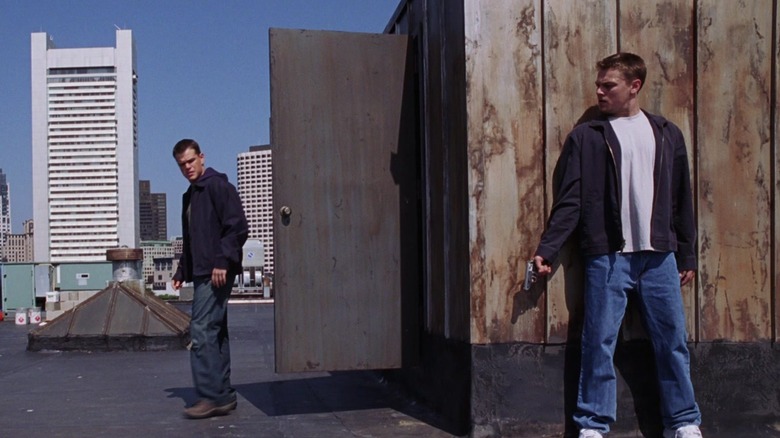
Warner Bros. Pictures
Directed by genre master Martin Scorsese, "The Departed" stars Leonardo DiCaprio and Matt Damon as two undercover operatives on opposite sides of the law. DiCaprio's Billy Costigan Jr. and Damon's Collin Sullivan don't meet face-to-face until the film's breakneck final act, the pair having spent the majority of the runtime trying to uncover the other's identity. With mob boss Frank Costello (Jack Nicholson) dead and his schemes put to rest, Costigan finally comes out of cover only to realize that Sullivan — the officer tasked with discharging him from a job that cost him his identity, sanity, and nearly his life — is a double agent. Soon after, Costigan draws him out to an abandoned building, where he plans to make Sullivan his first arrest (with the help of Anthony Anderson's Officer Brown).
Before he can, Costigan and Brown are suddenly shot and killed by Officer Barrigan (James Badge Dale), who reveals that he too was working for Costello the whole time. To finally conceal his involvement — and perhaps out of a sense of betrayal from Costello and Barrigan — Sullivan kills the latter, framing him as the rat. Avoiding formal judgment, Sullivan returns to his comfortable suite, where Mark Wahlberg's Sergeant Dignam is waiting to avenge the death of his colleagues. As Sullivan bleeds into the floor, a literal rat scurries along the rail of his balcony overlooking the city. It's an ending so audacious and breathless that it defies you not to watch the credits with your jaw on the floor.
13. Se7en
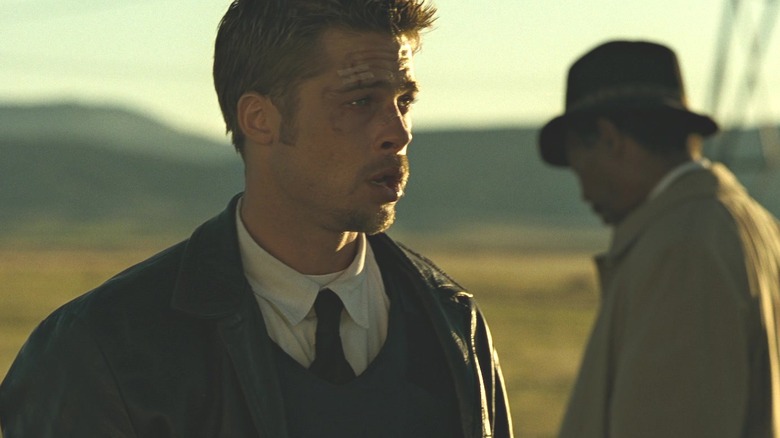
New Line Cinema
David Fincher's "Se7en" is widely regarded as one of the greatest thrillers ever made, and for good reason. It centers on idealistic young detective David Mills (Brad Pitt), who quickly finds his perception of justice, morality, and the world at large thrown into chaos when he partners with jaded investigator William Somerset (Morgan Freeman) on a gruesome homicide case.
Their target is John Doe (Kevin Spacey), a largely unseen but incredibly menacing presence who ultimately reveals himself to the police of his own will. As the detectives soon realize, this move is still a part of his plan to send a horrific religious message to the world by orchestrating intricate killings that demonstrate each of the seven deadly sins. His grand finale (and that of "Se7en") is the corruption of Mills, whose crisis of faith reaches its lowest point when Doe reveals that he killed and dismembered the detective's wife (Gwyneth Paltrow) — and that she had been pregnant with his child at the time. Ignoring Somerset's pleas for restraint, Mills shoots Doe dead in what is essentially a senseless and illegal act of murder, becoming the sin of wrath at Doe's behest while in part proving his myopic worldview.
Especially in its ending, "Se7en" exemplifies how strong a story can be when it follows that all-too-often ignored rule of changing the protagonist in irrevocable ways. Despite the simplicity of its structure, this finale gives the entire piece the feeling of a cinematic epic.
12. The Sixth Sense
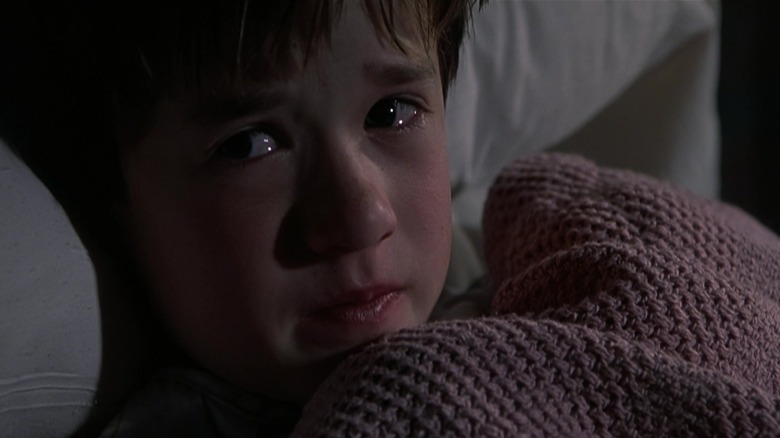
Walt Disney Studios
Known for crafting some of the twistiest and most controversial horror movie endings of all time, M. Night Shyamalan arguably accomplished his greatest feat of this kind with "The Sixth Sense." The film is now defined by both a ridiculously strong performance from child actor Haley Joel Osment (his delivery of the line "I see dead people" has surely made it one of the most-referenced movie lines in film history) and its final reveal that completely upends and alters the context of the entire movie.
Throughout the story, Bruce Willis' Dr. Malcolm Crowe is depicted as a child psychologist so traumatized by how he apparently failed one of his young patients (who broke into his house and shot him one night as the result of presumed schizophrenia) that he devotes all of himself to helping a boy named Cole (Osment) overcome a rare condition that forces him to commune with restless spirits. Of course, as many readers are surely aware, Malcolm eventually realizes that he is actually a spirit himself, having actually been killed by his patient that night.
What often gets overlooked with this massively popular ending, however, is that it reframes Malcolm's journey as one of acceptance — more than solving Cole's problems, he learns to let him help him come to terms with his own fate. As such, Malcolm is finally able to give himself and his wife (Olivia Williams) the peace they've needed for the entire film.
11. The Truman Show
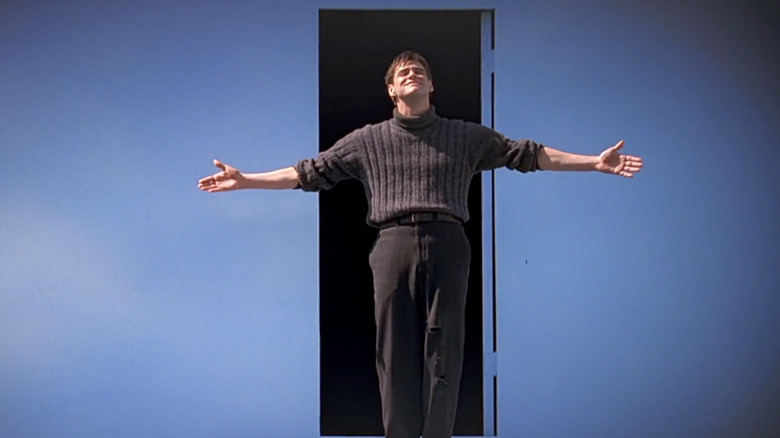
Paramount Pictures
Compared to other endings on this list, "The Truman Show" may seem a bit tame. Having spent his entire life basically as the oblivious star of a reality TV show, Truman Burbank (Jim Carrey) defies his castmates, the crew, and even his god-like director (Ed Harris) to sail to the edges of his soundstage cage. Upon reaching the door, the director entreats him to stay with promises of stardom and safety. In response, Truman repeats his reliable catchphrase ("In case I don't see ya, good afternoon, good evening, and goodnight!") one last time, and disappears with a dubiously sincere smile.
Part of the brilliance of "The Truman Show" is its sense of humor and overall carefully struck tone, which manages to deliver an otherwise terrifying premise as a wholly inspiring story about trusting oneself and risking discomfort to experience true growth. With its final scene, both Truman and the real audience of the film get to experience that unmatched catharsis of discovering truth and having that truth be validated in front of the entire world — only to then use that knowledge to pursue life as it was meant to be lived.
10. Silence of the Lambs
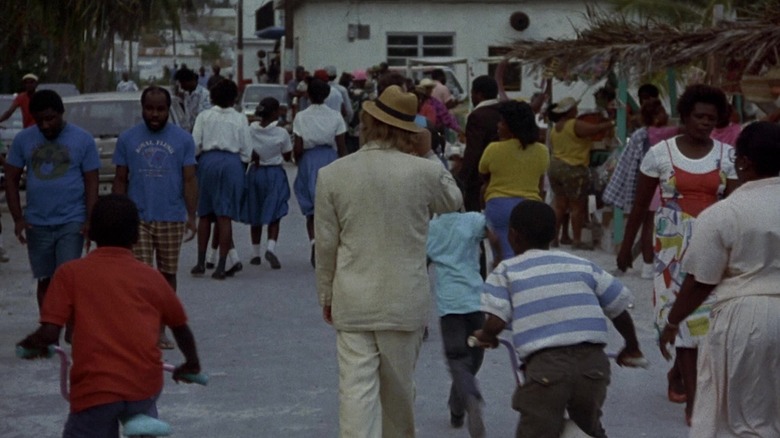
Orion Pictures
In her hunt for the deranged serial killer known as Buffalo Bill (Ted Levine), FBI agent Clarice Starling (Jodie Foster) is aided by the imprisoned mass murderer and cannibal Hannibal Lecter (Anthony Hopkins). With his help, she is able to track and corner "Bill" (real name Jame Gumb), leading to a memorable and visually striking finale in which she must survive his advances in a total blackout. She manages to kill him, seemingly putting this traumatic chapter of her life behind her — only for her to receive a call from Lecter in the final scene, with the killer revealing that he's used their collaboration as a means of escaping custody.
A film that is broadly about exploring the consequences of opening one's soul up to such darkness even when apparently necessary, The ending of "Silence of the Lambs" balances logical victory with crushing defeat. To leave the audience in any other fashion would have been a betrayal almost as deadly as Lecter's, and his escape opens up a world of possibilities that (though ultimately underwhelming in practice) leave the viewer with unparalleled dread only limited by their own imagination.
9. The Usual Suspects
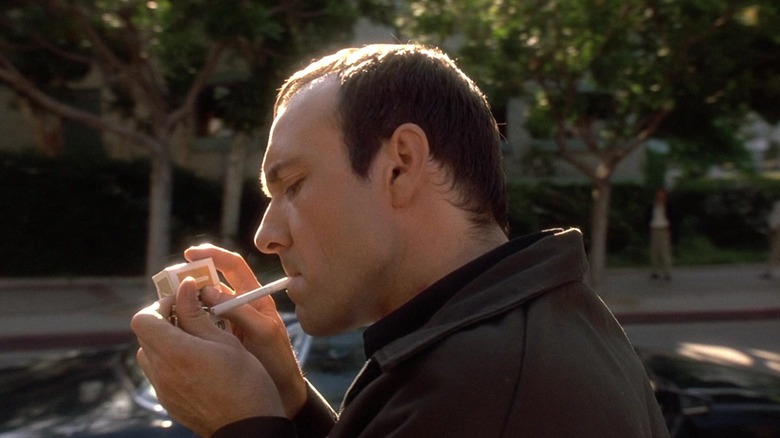
Gramercy Pictures
"The Usual Suspects" is an admittedly rough watch today, as it is unfortunately anchored by two of the most disgraced figures in the entertainment industry — director Bryan Singer and actor Kevin Spacey. The latter plays con artist Roger "Verbal" Kint, who apparently survives a massacre executed by a mysterious criminal named Keyser Söze, as explained throughout the film from his point-of-view.
By the end of "The Usual Suspects," however, the unassuming Kint is shown to be an entirely unreliable narrator, whose disarming physical and interpersonal behavior was no more than a cloak to conceal that he himself was the criminal mastermind Keyser Söze. Though Spacey is an understandably difficult actor to see on screen due to the allegations against him, his performance in the film in contrast to the rest of the ensemble is what makes this final twist so effective.
8. Psycho (1960)
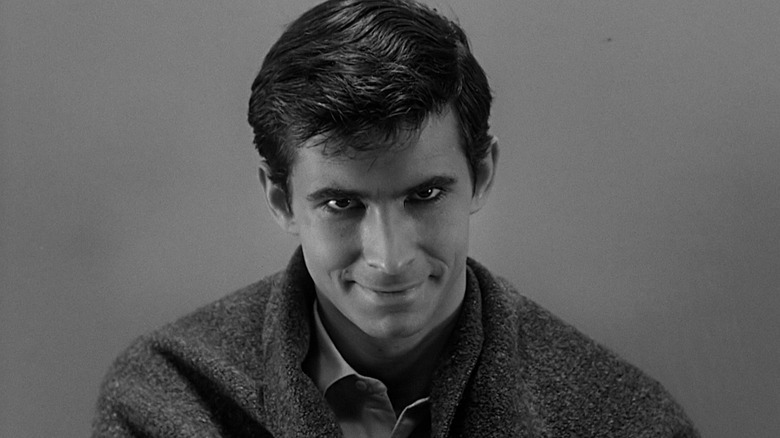
Paramount Pictures
Alfred Hitchcock's "Psycho" is likely what you think of when you see the words "classic horror film." And yet, it's formally subversive in a way most horror movies of any age aren't and delivers a chilling ending that few successors can hope to match. Having been revealed as the titular killer — adopting the personality of his late mother — Norman Bates (Anthony Perkins) is remanded to state custody. As the camera zooms in on Norman's uniquely frightening grin, the voice of his mother delivers a sinister monologue that further blurs the lines between them both.
Slightly similar to "The Silence of the Lamb's" Buffalo Bill, the potential roles of gender and sexuality have stirred some controversy with regard to "Psycho's" ending. That said, Norman's psychology is no less fascinating to discuss as a consequence six decades later, and the dual performances of Perkins and Norma Bates voice actor Jeanette Nolan create a moment that threatens to violate the boundaries of your screen.
7. Chinatown
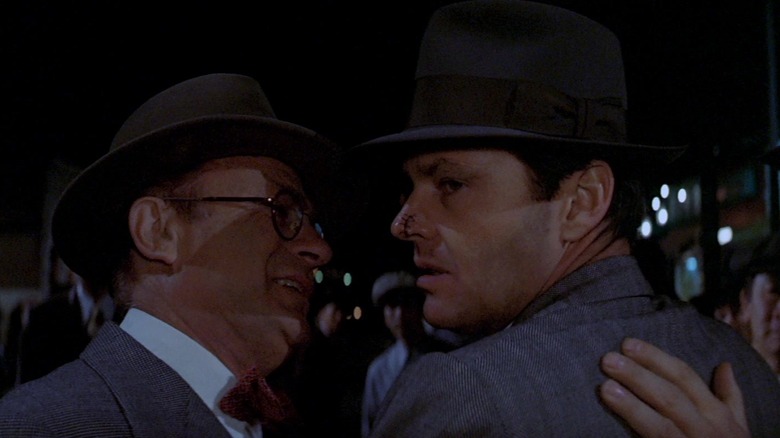
Paramount Pictures
By the time "Chinatown" approaches its final moments, the story has spun itself into a moral pit so deep and dark one can't help but yearn — even on a repeat viewing — for private detective J.J. "Jake" Gittes (Jack Nicholson) to somehow save Evelyn Mulwray (Faye Dunaway) and her daughter-slash-sister Katherine (Belinda Palmer) from the vile murderer Noah Cross (John Huston). Instead, Cross proves to be too powerful, managing to immediately paint himself as Katherine's grieving guardian after the police fatally shoot a fleeing Evelyn. When Gittes so much as flirts with the idea of exposing Cross, he's pulled away with the most iconic warning in cinema: "Forget it, Jake. It's Chinatown."
The entire sequence — from Evelyn drawing her weapon to the haunting discovery of her corpse to the stomach-churning embrace Cross inflicts on Katherine — is as dizzying as it is dread-inducing. The world of "Chinatown" is cruel, unforgiving, and devastating, and the film drives that home in merciless fashion during its finale.
6. Citizen Kane
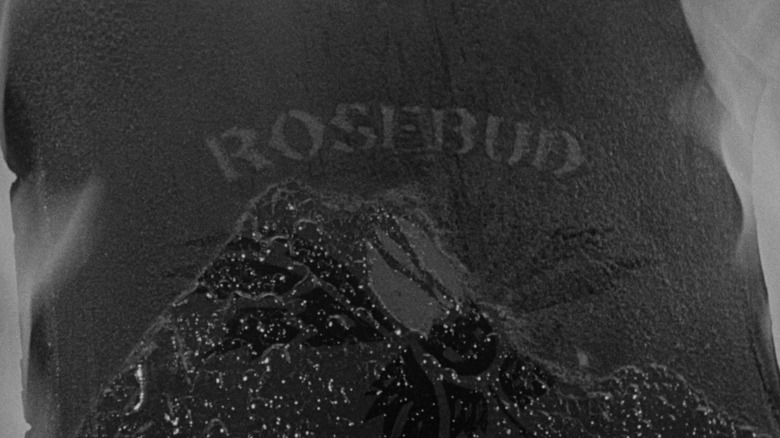
RKO Radio Pictures
Arguably a film most famous for its ending, "Citizen Kane" tells the story of a powerful news publisher and politician (director Orson Welles) through the investigation of a journalist following his death. In digging into his past, the journalist hopes to uncover why Charles Kane spent his final moments on Earth holding a snowglobe and beckoning "Rosebud." He is ultimately unsuccessful, though it is revealed to the audience that Rosebud was the name of a sled he had as a boy.
Through its association with family and childhood, the call of "Rosebud" seems to symbolize Kane's unending, almost hopeless longing for the short life he lived before he gained the power that made him newsworthy. Simple yet tragically effective, this iconic ending scene is the key to understanding why "Citizen Kane" is as haunting a cautionary tale as they come.
5. The Shawshank Redemption
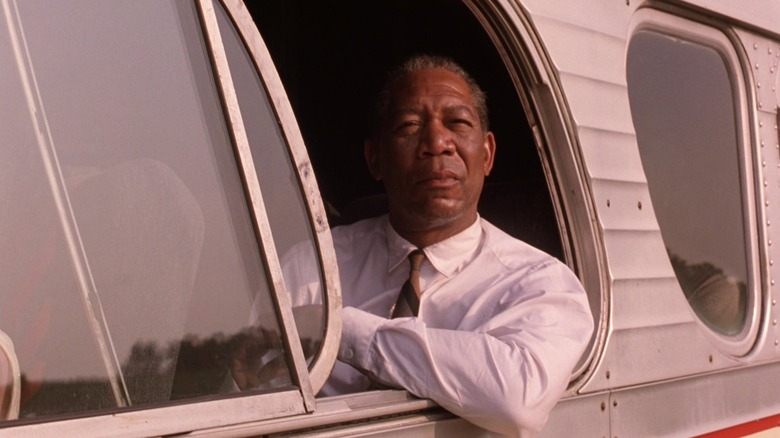
Columbia Pictures
In some regards, "The Shawshank Redemption" is one of the most horrifying stories to come from a Stephen King novel — though it's also the most cathartic. Tim Robbins and Morgan Freeman star as Andy Dufresne and Ellis "Red" Reddington, two men serving life sentences in a brutal prison. Toward the end of the film, after nearly two decades of abuse at the hands of guards and prisoners alike, Andy suddenly disappears — a hole in his cell wall revealing a patiently executed escape plan that has finally paid off.
Red is paroled not long after, but — like James Whitmore's tragic convict Brooks Hatlen — is losing hope that his life will ever return to normal. This changes when Red invests what remains of his waning faith in Andy one more time, ultimately leading to their reunion in the Mexican city of Zihuatanejo. With so much pain behind them, the final reward to the protagonists of "The Shawshank Redemption" is the definition of a life-affirming conclusion.
4. The Planet of the Apes (1968)
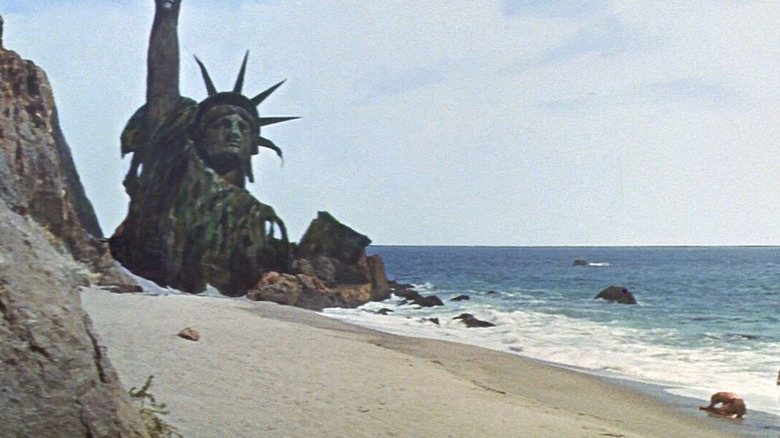
20th Century Studios
Though 1968's "The Planet of the Apes" may have taken the spirit of its darkly ironic ending from an episode of "The Twilight Zone," its ingenious employment within the context of the story not only makes for one of the greatest twists of all time but reveals a grim idea at the film's core. George Taylor (Charlton Heston), the only surviving astronaut after crash-landing strands his crew on an alien planet inhabited by apes hostile to "primitive" humans, ventures to the "Forbidden Zone" with some sympathetic apes in search of answers. Indeed, he finds the decaying Statue of Liberty, confirming that the planet is, in fact, Earth.
The explicit implication is that humanity was responsible for its own demise. The injustices Taylor and his comrades experience during their time stem from the apes' arrogant and barbaric sense of superiority — which may have done the humans in as well.
3. La La Land
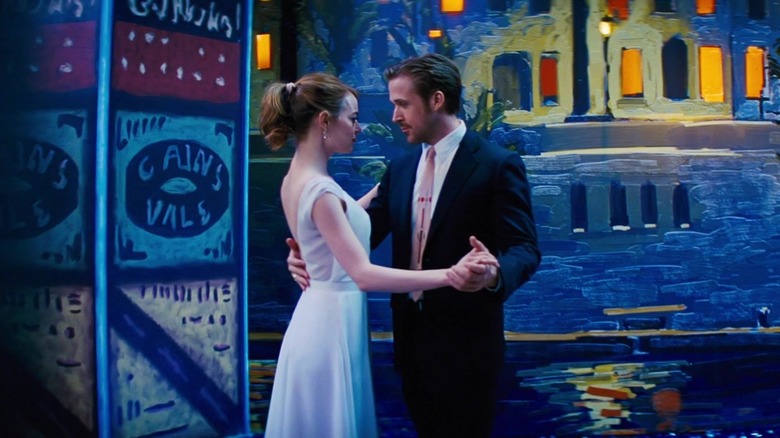
Lionsgate
Almost 10 years later, the ending of Damien Chazelle's "La La Land" still might be the sweetest pain we've experienced in a movie theater. Having decided to part years earlier so that they could pursue their ever-diverging creative journeys, Mia (Emma Stone) and Sebastian (Ryan Gosling) reunite unexpectedly when she — now a famous actor — wanders into his newly opened jazz club. With her husband.
Seb recognizes what's happening the moment he locks eyes with her in the crowd and, without a word spoken between them, begins playing their song. Though it produces vivid, musical images of what their life might've been had they stayed together, it ends the only way it can: with Seb alone at the piano. They share one final glance together — full of the teary, bittersweet joy that only actors of Stone and Gosling's caliber could conjure — and she's gone. It's a perfect synthesis of every aspect of filmmaking, from cinematography and scenic design to performance and, of course, music.
2. Dr. Strangelove
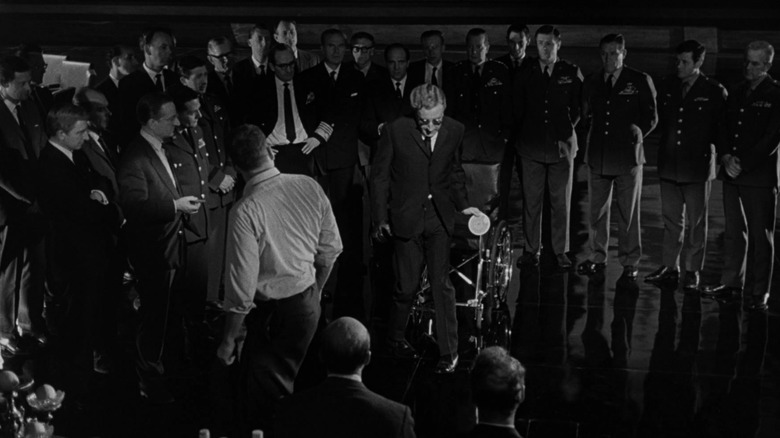
Columbia Pictures
"Dr. Strangelove — Or How I Learned to Stop Worrying and Love the Bomb" is a bizarre film, packed with almost enough black comedy and moments of absurdity to keep its end from being totally depressing. Almost.
Most of the plot concerns high-ranking United States military personnel trying to manage a colossal screw-up that risks turning the Cold War into a very, very hot one. And yet, even in their panic, they eventually realize their worst nightmares of nuclear warfare were a dream compared to the reality that, should they fail to correct course, the Soviet Union has in place a failsafe doomsday device capable of destroying the world. Not even the brilliant Dr. Strangelove (Peter Sellers) can advise the bumbling schemers any further.
Suddenly rising to his feet after being in a wheelchair the entire film, he can only express his surprise before the world is engulfed in explosions. It's a bewildering yet hilarious conclusion that calls into question the faith placed in those with their fingers on the button.
1. Casablanca
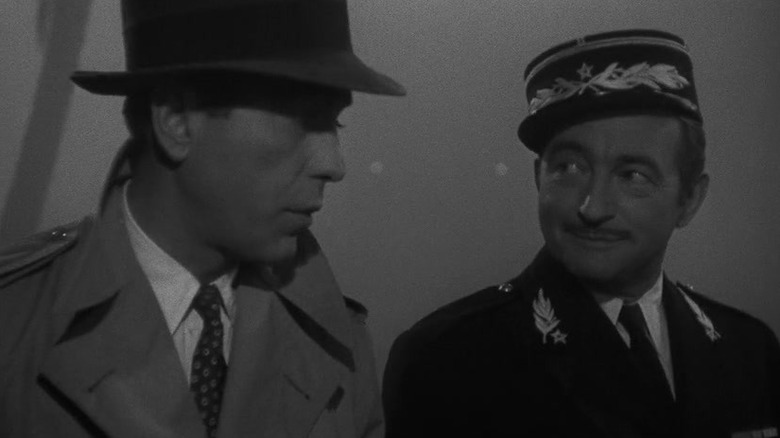
Warner Bros. Pictures
There is no twist at the end of "Casablanca." No game-changing reveal nor sudden, shocking upheaval of the status quo. Instead, what happens is that simple yet magical moment most great movies lead to — when an ordinary person believably makes a life-changing decision you couldn't imagine them making just an hour or so earlier.
Rick Blaine (Humphrey Bogart) is defined by his desire for neutrality and his longing for his lost love Ilsa Lund (Ingrid Bergman), two traits quietly in conflict with one another throughout the film. Though she reignites a dormant spirit of resistance within him — which one might reasonably assume should unite them at last — it's this very spirit in concert with his love for her that compels him to ultimately let her go for good. When she considers abandoning her revolutionary partner Victor Lazlo (Paul Henreid) for Rick, the latter insists she board the plane with him and lethally defends their escape. When the smoke clears, Rick is loveless but seemingly ready to fight for what he believes in once more.
With so many iconic lines delivered in such quick succession, the ending of "Casablanca" is debatably the best-written (and certainly most quotable) final sequence of all time. But more than that, it's an immediately effective, narratively rich, and character-driven resolution that satisfies and excites without the need to overanalyze its approach or even delve into too much symbolism. It's just good storytelling, crafted to perfection with only the necessary bells and whistles.









 English (US) ·
English (US) ·